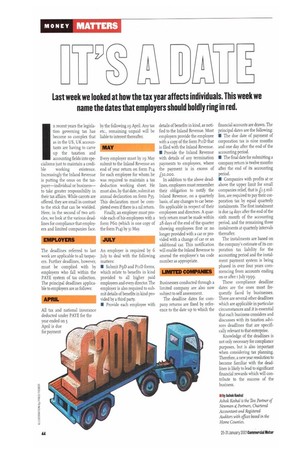Last week we looked at how the tax year affects
Page 46

If you've noticed an error in this article please click here to report it so we can fix it.
individuals. This week we name the dates that employers should boldly ring in red.
n recent years the legislation governing tax has become so complex that as in the US, UK accountants are having to carve up the taxation and accounting fields into specialisms just to maintain a credi ble working existence. Increasingly the Inland Revenue is putting the onus on the taxpayer—individual or business— to take greater responsibility in their tax affairs. While carrots are offered, they are small in contrast to the stick that can be wielded. Here, in the second of two articles, we look at the various deadlines for compliance that employers and limited companies face.
EMPLOYERS-1M
The deadlines referred to last week are applicable to all taxpayers. Further deadlines, however, must be complied with by employers who fall within the PAYE system of tax collection. The principal deadlines applicable to employers are as follows:
APRIL
All tax and national insurance deducted under PAYE for the year ended on 5 April is due for payment by the following 19 April. Any tax etc., remaining unpaid will be liable to interest thereafter.
Every employer must by 19 May submit to the Inland Revenue an end of year return on form P14 for each employee for whom he was required to maintain a tax deduction working sheet. He must also, by that date, submit an annual declaration on form P35. This declaration must be completed even if there is a nil return.
Finally, an employer must provide each of his employees with a form P6o (which is one copy of the form Pi4) by 3i May.
An employer is required by 6 July to deal with the following matters: • Submit P9D and PHD forms, which relate to benefits in kind provided to all higher paid employees and every director. The employer is also required to submit details of benefits in kind provided by a third party.
• Provide each employee with details of benefits in kind, as notified to the Inland Revenue. Most employers provide the employee with a copy of the form PHD that is filed with the Inland Revenue.
• Provide the Inland Revenue with details of any termination payments to employees, where the payment is in excess of £30,000.
In addition to the above deadlines, employers must remember their obligation to notify the Inland Revenue, on a quarterly basis, of any changes to car benefits applicable in respect of their employees and directors. A quarterly return must be made within 28 days of the end of the quarter showing employees first or no longer provided with a car or provided with a change of car or an additional car. This notification will enable the Inland Revenue to amend the employee's tax code number as appropriate.
coMPAiie
Businesses conducted through a limited company are also now subject to self assessment.
The deadline dates for company returns are fixed by reference to the date up to which the financial accounts are drawn. The principal dates are the following: • The due date of payment of corporation tax is nine months and one day after the end of the accounting period.
• The final date for submitting a company return is twelve months after the end of its accounting period.
• Companies with profits at or above the upper limit for small companies relief, that is .1.5 million, are required to pay their corporation tax by equal quarterly instalments. The first instalment is due 14 days after the end of the sixth month of the accounting period, and the remaining three instalments at quarterly intervals thereafter.
The instalments are based on the company's estimate of its corporation tax liability for the accounting period and the instalment payment system is being phased in over four years commencing from accounts ending on or after iJuly 1999.
These compliance deadline dates are the ones most frequently faced by businesses. There are several other deadlines which are applicable in particular circumstances and it is essential that each business considers and discusses with its taxation advisors deadlines that are specifically relevant to that enterprise.
Knowledge of the deadlines is not only necessary for compliance purposes, but is also important when considering tax planning. Therefore, a new year resolution to become familiar with the deadlines is likely to lead to significant financial rewards which will contribute to the success of the business.
• by Ashok Kasha]
Ashok Koshai is the Tax Partner of Newman eZ Partners, Chartered Accountant and Registered Auditors with offices based in the Home Counties.




































































































































































































